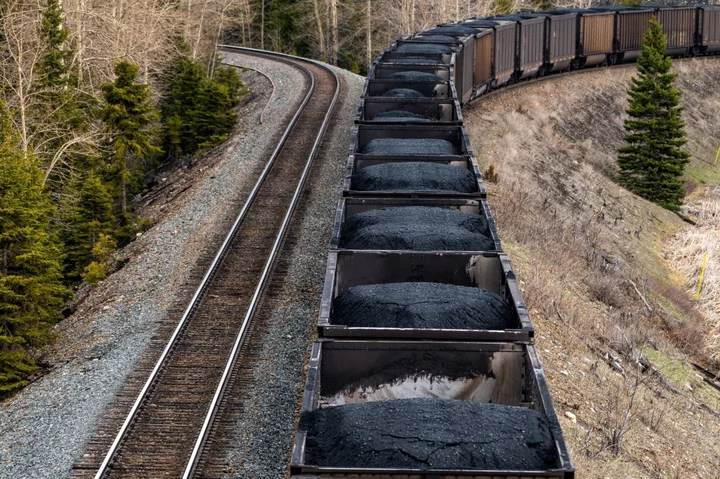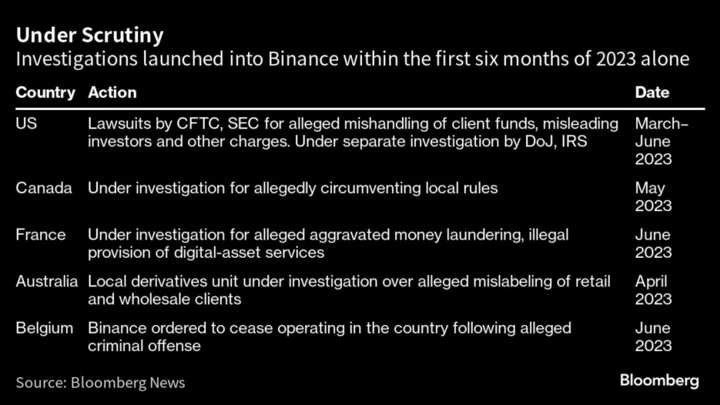Glencore Plc will buy a majority stake in Teck Resources Ltd.’s coal business, ending a months-long saga and setting the stage for the commodity giant to exit the coal business itself.
The two companies have spent much of the year in a bitter public fight after Teck rejected an unsolicited $23 billion offer from Glencore, which proposed creating two new metals- and coal-focused companies. The Glencore offer, while unsuccessful, was enough to disrupt an earlier plan by Teck to spin off its coal business.
For Glencore and its relatively new chief executive officer, Gary Nagle, the deal represents a company defining moment that will pave the way for an exit from its hugely profitable but polluting thermal coal business and leave it focused on metals needed for the energy transition. Glencore intends to put the combined coal operations into a new company listed on the New York Stock Exchange within two years of the acquisition closing, Nagle said.
“I don’t think this is a second prize,” Nagle said on a conference call. “We’ve done very well acquiring an excellent asset.”
In the deal announced Tuesday, Glencore will pay $6.93 billion for a 77% stake in Teck’s business, while steelmakers Nippon Steel Corp. and Posco, which currently own minority stakes in Teck coal mines, will own the rest. Glencore said it also expects to pay $250 million to $300 million to acquire a shareholder loan made by Teck to the coal business. The Glencore deal, which requires Canadian government approval, implies an enterprise value of $9 billion for Teck’s coal business.
Glencore shares rose 3.1% by 10:38 a.m. in London, while Teck gained 5.1% in premarket trading in New York.
The fight over Teck has highlighted the challenges facing miners with large coal operations — the businesses are big profit drivers for both companies, but many investors are increasingly reluctant to hold exposure to the polluting fossil fuel.
Before the Teck proposal became public, Glencore had previously said it would continue running its mines until they were depleted, even as many of its rivals pulled out of the thermal coal business under pressure from investors. Assuming Glencore’s plans to split out the business proceed, its remaining operations — like Teck’s — will be focused on metals such as copper and zinc.
Glencore’s successful coal bid is an ironic end to the acrimonious saga, after Teck and its controlling shareholder, Norman Keevil, pointedly attacked the Swiss company’s track record in rejecting its takeover proposal earlier in the year. The deal will ensure “continued socially and environmentally responsible steelmaking coal operations and enhanced benefits for Canada,” the Canadian company said on Tuesday.
For Teck, the deal finally ends its struggle to find a solution for its mines that produce steelmaking coal after years of studying various options to separate it. The company had initially planned a complicated spin off that left it paying royalties to the remaining metals business, before Glencore disrupted the plan.
Nippon Steel, which currently owns 2.5% in some of Teck’s coal assets, will convert the ownership and put in additional cash to take a 20% stake in the business, while Posco will convert its ownership stake in Teck mines to a 3% holding in the business.
Teck, which will now have no exposure to the coal business, said it will use the proceeds to pay off debts, build new metal mines and return some to shareholders.
“We were able to achieve what we saw as the best value for this transaction as well as a clean separation,” said Teck CEO Jonathan Price. “The valuation for this transaction was clearly superior.”
The deal caps a difficult year for the Canadian miner. Alongside the bruising takeover battle with Glencore, it has also faced a cost blowout at its flagship new copper mine in Chile which was originally the main lure for Glencore. The company must now reassure shareholders that it can use the coal sale proceeds to build new copper mines on time and on budget.
The Glencore deal won’t require a vote by Teck’s shareholders, unlike the earlier spinoff plan that was abandoned after it failed to win enough support.
The separation of the coal business may also make Teck a target for some of the industry’s biggest names, who are keen to add more exposure to copper. Teck said Tuesday that Glencore had agreed to a two-year standstill from the time of closing, which would prevent it making a further unsolicited takeover bid.
The deal will need to be approved by the Canadian government, which has been increasingly focused on protecting the country’s natural resources. The fight over Glencore’s initial takeover offer drew the attention of federal and regional government officials.
(Updates with additional details. An earlier version corrected a company name.)









